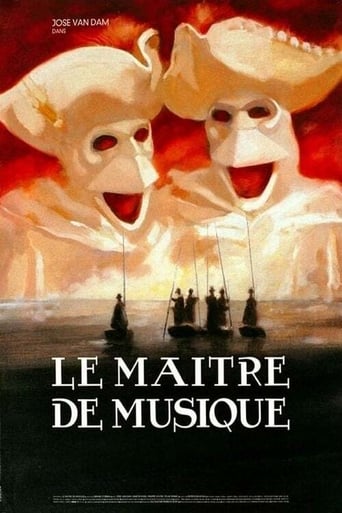lasttimeisaw
As a dark horse, this Belgian film surprisingly got an Oscar nomination for BEST FOREIGN LANGUAGE FILM in 2009, directed by Gerard Corbiau, whom maybe we feel more familiar with for his later work FARINELLI (1994), another music-related opus, with a more dramatic pathos within. Ominously the music itself steals the thunder of the film per se, which leaves it in an awkward position, where only genuine opera lovers could rigorously indulge themselves with it while for laypeople like me, the waning correlation is unavoidable and discouraging. The film stars a real maestro José van Dam (the celebrated Belgian bass-baritone) as a singer, who is compelled to retire in his middle-age by his arch enemy, the Duke, with the help of his loyal wife, he trains two disciples and finally get his vengeance over the Duke. However Mr. van Dam's stiff performance could not be excused as a stark novice stage-fright; two young leads Anne Roussel and Philippe Volter also fail to be impressive apart from their singing parts. By contrast, only Sylvie Fennec and Patrick Bauchau deliver some sincere acting skills without too much superficial showing-off. The setting, costume and all its delicate props are in their right places to exude a bourgeois sentiment which casually goes well with the film's uneventful narrative. The final showdown is a fleeting opera duel between two respective disciples from the maestro and the Duke. The mask tableau is a major attraction, too bad it just ends like that, without too much aftertaste. After all, one cannot complain more about this film as long as music save us all from this molecularly mundane world.
Michael Neumann
Belgium's nominee for the Best Foreign Language Film Oscar of 1988 is an elegant highbrow crowd pleaser, in which music scores by Verdi, Mahler, Mozart et al get top billing over the actors, and not without good reason. World-renowned baritone Jose van Dam stars as a (surprise) world-renowned baritone, who for reasons never fully explained abruptly retires to train aspiring soprano Anne Roussel and (again for unclear reasons) a common thief with a raw singing talent. But what begins as a polite, continental variation of 'Pygmalion', with all the usual trappings of a turn-of-the-century period piece, works up considerable steam when, unknown to van Dam, his arch enemy Prince Scotti begins training his own protégé, hoping to match him against his rival's two pupils in a no-holds-barred aria duel (to the death?) It's a thrilling (if slightly ridiculous) climax, and goes a long way toward compensating for some of the film's earlier, nagging deficiencies. If for no one else, this is a must for classical music aficionados.
nfouqet
I have just watched this film for the second time after nearly twenty years and it surprised me. I did not find it so intense and dramatic as it seemed to me the first time I saw it. The arias are beautiful, although I am not an opera lover, and the photography is gorgeous.The fault that I found with the film is its rather fast pace that conspires against the development of the characters and the whole drama. The young protegé of Dallayrac (Jose van Dam) goes through some very hard times and, all of the sudden, he is ready for the competition. It could, and would, have been better if the relationship master-pupil between Dallayrac and Jean had be given some more coverage since he (Jean) represents the greatest challenge for the aging master.The final scene where the two tenors face each other in a grand finale is fairly predictable and takes away much of the dramatic climax.Having said this, on a broader outlook it still remains a very nice and moving film, particularly when we put it against most of the films of the last twenty years, full of irrelevant stories, unnecessary bloodshed and foul language, with characters that do not show any redeeming qualities.
beptep
I certainly disagree with the viewer who called this tedium--after all when one can't tell Mahler's Songs of Ruckert from a symphony, he is no music lover! The recurring song ("Ich bin der welt abhanden gekommen") is very meaningful for it is associated with the teacher, a retired performer (brilliantly played by opera star Jose Van Dam). The words of the song translate as " I am lost to the world with which I used to waste so much time. It has heard nothing from me for so long it may well believe me dead." The song concludes with "I live alone in my heaven, in my love, and in my song." I played this film for a class of students whose knowledge of classical music was nil and they liked it. Of course the young leads were attractive and there was some sex in the film. I suggest you view it should you get the chance. It is one of my favorite films, and you really don't need to be knowledgeable in music to like it as long as you like beauty.




